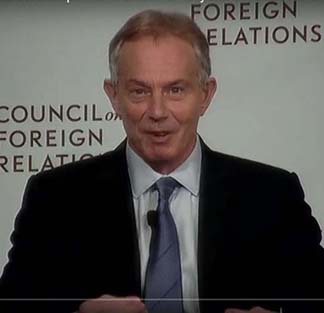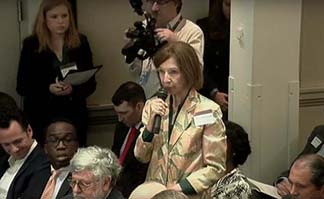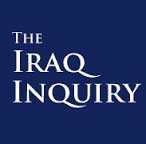Sept 29, 2016
Tony Blair was in town for the opening of the United Nations, which draws heads of state, foreign ministers, and people who think they ought to travel in those circles. Former British Prime Minister Blair was one of the latter. One of the architects of the Iraq War, he came to attempt to reinvent himself as a humanitarian. He has set up the Tony Blair Faith Foundation to work with education programs to deal with extremism across the world. To help stop it. (Do you know the meaning of chutzpah?)
He has also reinvented himself as a very rich guy, selling his services to various Gulf sheiks and the president-for-life of Kazakhstan.

Blair had the help of the Council on Foreign Relations, which aided his PR offensive by pairing him in a meeting with UNESCO head Irina Bokova to discuss “the role of education and civil society in preventing global extremism and raising awareness among governments.”
It was a surreal event. In his remarks, he never mentioned the Iraq War. You recall that Blair, known as “Bush‘s poodle” (“I will be with you, whatever”) took the UK into the disastrous Iraq War, for which he has just been condemned by the British Committee of Privy Counsellors in The Report of the Iraq Inquiry, known as The Chilcot Report, after its chair.
Among the litany of Blair’s calamitous decisions, it noted that the British “chose to join the invasion of Iraq before the peaceful options for disarmament had been exhausted”; that military action “was not a last resort”; that when the United Nations weapons inspector Hans Blix said weeks before the invasion that he “had not found any weapons of mass destruction and the items that were not accounted for might not exist,” Blair wanted Blix “to harden up his findings.” Blair knew that Bush‘s purpose was regime change.
And when the Baathist military were sent home (but not disarmed), they created ISIS. And the conflict metastasized throughout the region, yielding armed conflict and terrorism on a level that had never existed in the region before. (At least not since the Crusades.)

So I asked Blair, “Thinking critically, [he had been talking about the need to get the Islamists to think critically], what role in educating the people who became extremists was played by the fact that their countries were invaded, intervened, bombed by forces led by your country, for which a report in the U.K. now blames you substantially, condemns you substantially, and the Americans under Bush”what lesson do they get from that?
And do you think that can be challenged by giving them some books or classes? Or should there be”is there another lesson that you learned from that?
BLAIR: OK, I think I know where you‘re coming from. (Laughter. After all, it‘s the neoliberal Council. In the UK, he would be booed.) He quickly deflects the question to what other leaders did.

Look, let me be very frank with you, because there‘s not just that report on Iraq, by the way; there‘s a recent report on Libya which then accuses David Cameron of having promoted extremism by the action in Libya. There are people who will say that the Russian actions in Chechnya promoted extremism. For the French by the way they”it‘s the cartoons that have provoked extremism, the French action in Mali. You can disagree with foreign policy decisions, whether in Iraq, Afghanistan, Libya, wherever else in the world.
He moves from detailing other western failures to declare that none of it mattered! The roots of this extremism are not to be found in foreign policy in the West, and we will make a fundamental mistake if we believe that they are.
Now, you can agree or disagree with these decisions. And you can say, well, as a result of that decision, you enlarged the space for these people to operate, right? We can have that debate, and that‘s one debate. But the question we‘ve got to ask ourselves is why”let me take not the one that you might expect me to be defensive on, but let me take Libya, OK?
Why is it, when you remove a regime that was undoubtedly a brutal one, and you give the country a chance to get on the path to democracy, and you put a large amount of aid into it, and you try and bring everyone together”why is it that there are elements that then through terrorism try and disrupt that whole process? And that‘s the question you‘ve got to ask, because otherwise what we do is we effectively bolster the propaganda of those people who were attacking us.
You know, it‘s like today in France you have people who say by banning the so-called burkini, right, in France, you‘re going to provoke terrorism. Now, you can agree with banning the burkini or not banning the burkini, it‘s one debate. You end up by saying by taking that action you are provoking terrorism, in my view, you are making a big, big mistake.
The roots of this are deep. You know, they‘re generational. It‘s why it‘s going to take a long time to deal with it. So you can make the point about being against the foreign policy decisions that I took or others have taken since then but, you know, the foreign policy we have engaged in”for example, in Syria”is the very opposite of the policy we engaged in in Iraq. Has the outcome been better?
Generational? Was there Islamic extremism and terrorism of the sort we see today roiling the region and threatening Europe and the U.S. generations ago?
Blair: OK, so my issue is agree/disagree with the foreign policy. But we will make a fundamental mistake if we think this extremism arises from what we‘re doing. We haven‘t caused it. We got caught up in it. And we‘ve got to learn the lessons both of what we did over the last 15 years in both sets of foreign policies that we‘ve engaged in since then.
But the fundamental thing that we have got to get right is to understand the depth of this issue. And education is a necessary part, not because it‘s going to cure it by”you know, you‘re not going to stop terrorism by putting books into classrooms, that‘s true. But you will help defeat the ideology if you educate the next generation of young people to be culturally open to those that are different.
Blair’s answer: Forget the Iraq War and the Western bombing of Middle Eastern countries. The West can end Islamic extremism through cultural education. Yada yada yada. Well, maybe planes can drop books instead of bombs.
The Sept 22 text and video are here, with Lucy‘s question at 38:25. The Chilcot Report is here.
More about the report.


Terrific. Good and fair of you to reprint so much of Blair’s answer. Your slogan “Drop Books not Bombs” may live along with “Make Love not War.”
LK: I printed all of his answer. An editor I once had said if you run something critical of somebody, give that person their best shot in print.